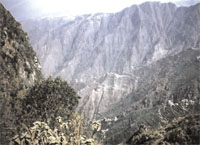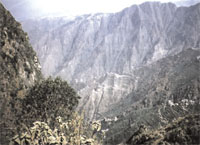
Sulfis recruited to fight Houthis Sa’ada war escalates [Archives:2007/1046/Front Page]
April 30 2007
 |
SA'ADA, April 29 – A tribal source mentioned that fierce confrontations are escalating between Yemeni government forces and Houthi followers in Sa'ada, located some 245 km. north of Sana'a, leaving hundreds killed or injured daily.
It added that the governorate's hospitals no longer are capable of holding the increasing number of victims among soldiers and their supporters from Sulfis and tribal fighters, while Houthis receive no medical attention. The sources questioned the role of Doctors without Borders and the Red Cross organization, which are absent from scene, as well as the weak role of the Yemeni Red Crescent organization in Sa'ada.
Sources also mentioned that Yemeni army forces supported by helicopters and fighters still are attacking areas where Houthis exist, especially Dhahian city, which has been the scene of the fieriest and longest clashes between the two sides since the war began. The Yemeni army also is attempting to seize Bani Mu'ath district's Fakawah Shi'eb, where Houthis have their largest camp.
Helicopters are bombarding Razih district north of Sa'ada, particularly as Houthis are centered in the district's government buildings in Al-Qal'ah area. Army forces continue their attacks on Houthis on Burkan Mountain.
Sources also revealed that Yemeni army forces withdrew to Al-Dhai'ah area due to strong resistance by Houthis, as well as to enable armed helicopters and mortars to secure the way leading to Razih, which Houthis had occupied by the start of this week.
Further, Al-Talh, Al-Saifi and several areas near Magz witnessed violent battles late Saturday evening and Sunday morning; however, neither side's losses have been identified.
“Sahar's Al-Sanarah and Al-Ablah Mountains also witnessed similar clashes, as large numbers of Houthi loyalist were seen last Saturday in mountains near Al-Ablah Mountain, so army forces bombarded the mountain last Friday with mortars and Katyusha missiles,” a source reported.
Confrontations between both warring sides are ongoing in Bani Mu'ath, killing and injuring large numbers of fighters. Moreover, a helicopter waged an air raid on Houthis centered on Sabr Mountain.
“Last Saturday morning, Houthis attacked Al-Sanarah and Al-Ablah military sites inside Sa'ada city using mortar shells. This is the second time confrontations have expanded into the governorate's capital,” a source noted.
The Houthi attack on the two military sites was timed to coincide with President Ali Abdullah Saleh's meeting with Sa'ada Sulfi preachers before Friday prayer, a step observers understood as a cover for continuing the war and holding scholars accountable for such a decision.
The Yemeni Armed Forces-affiliated 26September.net web site reported that several military units managed to seize two areas previously controlled by Houthis. It added that military forces forced Houthis out of Bani Mu'ath area. Many fled to nearby areas and some surrendered. Government forces also seized large quantities of weapons and munitions, as well as cars used by Houthis in that area.
The web site went on to say that clashes are ongoing in some areas neighboring Razih and Qataber districts and that the Yemeni army aims to take full control of both districts.
President Saleh announced the Yemeni government's determination to halt the Houthi movement led by Badraddin Al-Houthi, indicating that the only option left for Houthis is to surrender and hand over their weapons to government authorities.
“We have assured many times that Houthi loyalists have no way out except to surrender their arms and themselves to authorities if they want to escape death and prevent bloodshed,” the president said, addressing a group of Sa'ada Sulfi scholars.
He added that what Houthis are doing is an abomination that should be terminated because it is harming the nation and citizens' interests, stressing his government's resolution to eliminate Houthis and quell their revolution.
“Resorting to war was imposed upon the state in order to face aggressive Houthi acts. It was necessary for the state to act responsibly to face such elements and force them to abandon their aggressive acts,” Saleh maintained.
He went on to say that the slogans Houthis chant are misleading and deceive ignorant elements, thus leading them to death. “By their slogans, they really mean death to the revolution and the republic. They also kill innocent citizens and security and armed forces personnel,” the president alleged.
Saleh concluded that scholars should stand against such sedition because it's a national, religious and moral duty, calling on them to spread awareness among the public and warn them against insurrection against the state.
Agence France-Presse quoted a foreign diplomat as saying, “Over 1,000 Yemeni soldiers have been killed since the war erupted at the end of January.”
The diplomat added that, “War is catastrophic. There will be no military solution. At a certain point, the two parties will have to negotiate ut such negotiations may take place after two weeks or 10 years.”
Several Arab organizations, mostly Egyptian, have called for halting the war and expressed their concern about human rights violations resulting from excessive use of arms by security and army forces, something occurring under the total media blackout.
These organizations, in collaboration with Yemeni ones, called on President Saleh to end the crisis and allow the media, human rights organizations and international relief agencies to visit the area to determine the situation there and perform their human tasks.
British Intelligent Magazine recently published a report indicating that arms tradesmen, military leaders and Sulfi sheikhs are the beneficiaries of the Sa'ada war and that Yemen's political system has joined the rivaling forces to seize state resources.
“Prolonging the war will benefit no one but the ruling and corrupt minority by suspending development reforms demanded by the Gulf Cooperation Council, which finances half of the budget required for the required reforms against $4.7 billion,” the magazine reported.
It added, “By weakening the Zaidi minority, Yemeni armed forces will remove the last obstacle before the Sulfi stream to have full control of Yemeni religious and political life.”
Media sources from Abyan mentioned that a senior jihadist leader, also affiliated with the ruling General People's Congress party, is supervising the training of more than 10,000 Sulfi jihadists amassed from various areas. They are being provided arms to fight side by side with government forces alongside 5,000 others already fighting Houthis in Sa'ada.
The sources added that some Sulfi leaders are exerting efforts to recruit extreme Sulfis in Ibb, Dhamar and Taiz to fight against Houthi loyalists in Sa'ada.
Further, an Aden-Abyan army leader, described by the U.S. State Department as a jihadist, joined the Sa'ada war in February to fight against Houthis. The regime used same elements as a paramilitary organization during Yemen's 1994 Civil War against the Socialists.
——
[archive-e:1046-v:15-y:2007-d:2007-04-30-p:front]


